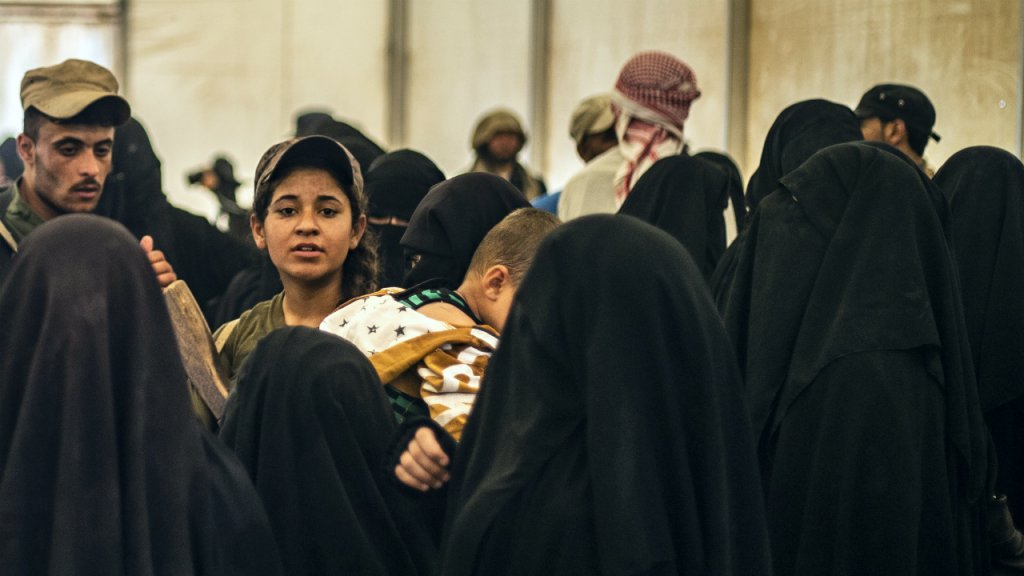Syrian Kurds repatriate 8 people from IS group families to US

Two American women and six children from families of suspected Islamic State (IS) group members were repatriated to the United States on Wednesday in the latest transfers from a crowded camp in Syria.
The move is part of an effort by the Kurdish administration in northeast Syria to reduce the population of Al-Hol, which is crammed with nearly 74,000 people from more than 40 countries.
It comes after Norway on Monday retrieved five Norwegian orphans from the same camp and Kurdish authorities started sending hundreds of Syrian women and children home as part of a wider effort to clear Al-Hol of its Syrian inhabitants.
Uzbekistan said it repatriated more than 100 nationals from Syria last week.
Wednesday’s repatriation was carried out “at the request of the US government and based… on the free and voluntary desire of the American citizens to return to their country without any pressure or coercion”, spokesman Kamal Akef said in a statement.
Akef told AFP the eight were from “IS [another term for the IS group] families” staying in Al-Hol, which is populated by suspected IS group members, their families as well as regular civilians forced out of their homes by successive US-backed assaults against the last bastions of the jihadists’ “caliphate”.
In Washington, a State Department spokeswoman confirmed that the United States had “safely recovered” citizens including young children from Syria and was assisting in their repatriation.
She declined to identify them due to privacy considerations.
Tricky repatriation
The Kurdish administration is looking to take off its hands thousands of foreign jihadists and their relatives trapped in Kurdish-held camps and detention centres following the declared defeat of the IS group proto-state on March 23.
But repatriation is a sensitive issue for Western nations such as France and Britain, which have experienced attacks by homegrown extremists and have little interest in seeing more return.
Britain has gone so far as to strip IS group members of citizenship, while France has said it will repatriate only orphans.
The United States, however, has urged Western countries to take their nationals back and has started repatriating some if its own.
Prior to Wednesday, the United States had taken home three IS group fighters for prosecution and also repatriated one woman with her four children, according to the State Department.
The State Department spokeswoman said that the United States was aware of more purported US citizens in Syria but that the cases were “extremely complicated” due to conditions on the ground and the lack of US consular access.
“We take seriously all legitimate claims of US citizenship, no matter where those claims are made, and work to verify and handle those claims on a case-by-case basis,” she said.
But the United States baulked in the most high-profile case – Hoda Muthana, a young woman from Alabama who joined the IS group.
The United States in February said that Muthana was not a citizen due to her father’s former diplomatic status.
The US Constitution grants citizenship to everyone born in the country – with the exception of children of diplomats, as they are not under the jurisdiction of the United States.
Muthana’s father, Ahmed Ali, served at the Yemeni mission at the United Nations.
He has filed a lawsuit seeking to affirm his daughter’s citizenship, saying he had left his diplomatic post several months before her birth.
Tinderbox
The Kurdish administration and aid agencies have warned of deteriorating humanitarian conditions in Al-Hol, where acute malnutrition, pneumonia and dehydration are rife among children in the camp.
“The situation in the camp is very difficult,” Sheikhmous Ahmed, an official with the Kurdish administration, told AFP earlier this week
He accused the international community of “neglecting its responsibilities towards the displaced” in Al-Hol, most of whom were evacuated from the “caliphate”.
Some evacuees from IS group areas have been repentant, but others have made clear their allegiance to IS group remains intact, turning Al-Hol into a tinderbox.
Residents have reported clashes with guards, violent factional quarrels, warning that Al-Hol is emerging as a fresh jihadist powder keg.
In recent weeks, women in the camp have staged demonstrations demanding better services as well as information on their husbands held by the Kurds, according to the UN’s humanitarian office.